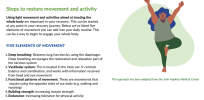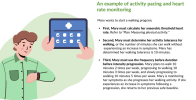Dolphin
Senior Member (Voting Rights)
Now published, see post #4
------------------------------------
Free:
https://www.medrxiv.org/content/10.1101/2024.05.25.24307912v1
Complex Chronic Diseases Program: Program Description & Health Outcomes Assessment from a Clinical Data Registry
Emily Meagher, Tianna Magel, Travis Boulter, Carola Muñoz, Nicole Prestley, Wee-Shian Chan, Cassandra Bryden, Luis Nacul
doi: https://doi.org/10.1101/2024.05.25.24307912
Abstract
Introduction
The Complex Chronic Diseases Program (CCDP) was funded by the BC Ministry of Health to address gaps in health services provision for Complex Chronic Diseases (CCDs). The Program offers medical interventions and education on self-management for people with Myalgic Encephalomyelitis/Chronic Fatigue Syndrome (ME/CFS), Fibromyalgia (FM), and Chronic Lyme-Like Syndrome (CLLS). The CCDP Data Registry was created in 2017 for monitoring participant outcomes and program evaluation.
Methods
This research outlined the CCDP model of care and analyzed patient-reported questionnaires and clinical data collected longitudinally from consented CCDP Data Registry participants spanning June 2017 through September 2022. T-tests and linear regression modelling were conducted to ascertain changes in symptom presentation across program involvement. These analyses specifically targeted data at the following time points: baseline, 6 months follow-up, and discharge.
Results
Data reported in this study represented 668 eligible participants from the 1-year Program. Demographically, the average age was 49 years old (SD=13), 90% were women (n=557), 54% were diagnosed with ME/CFS and FM (n=360), and 36% reported being on long term illness/disability (n=219). Between baseline and discharge, participants with ME/CFS and FM reported improvements in overall physical and mental health, but no significant improvement in other symptom domains such as sleep, fatigue, and pain. The duration of disease at baseline was only related to sleep quality. The previous, more individualized model of care showed better mental health outcomes at 6-months follow-up.
Discussion
This analysis showed that CCDP patients experienced relatively severe and persistent symptom presentations. Participants involved in the Program experienced some health benefits at discharge, but further research and interventions are needed to optimize health outcomes. The reliance on self-report of symptoms and the absence of a control group without intervention limit the significance of these findings. A Strategic Direction Plan was developed by the CCDP which emphasized improved training, decentralized services, fast-tracking of eligible individuals, and enhanced education for better patient outcomes.
------------------------------------
Free:
https://www.medrxiv.org/content/10.1101/2024.05.25.24307912v1
Complex Chronic Diseases Program: Program Description & Health Outcomes Assessment from a Clinical Data Registry
Emily Meagher, Tianna Magel, Travis Boulter, Carola Muñoz, Nicole Prestley, Wee-Shian Chan, Cassandra Bryden, Luis Nacul
doi: https://doi.org/10.1101/2024.05.25.24307912
Abstract
Introduction
The Complex Chronic Diseases Program (CCDP) was funded by the BC Ministry of Health to address gaps in health services provision for Complex Chronic Diseases (CCDs). The Program offers medical interventions and education on self-management for people with Myalgic Encephalomyelitis/Chronic Fatigue Syndrome (ME/CFS), Fibromyalgia (FM), and Chronic Lyme-Like Syndrome (CLLS). The CCDP Data Registry was created in 2017 for monitoring participant outcomes and program evaluation.
Methods
This research outlined the CCDP model of care and analyzed patient-reported questionnaires and clinical data collected longitudinally from consented CCDP Data Registry participants spanning June 2017 through September 2022. T-tests and linear regression modelling were conducted to ascertain changes in symptom presentation across program involvement. These analyses specifically targeted data at the following time points: baseline, 6 months follow-up, and discharge.
Results
Data reported in this study represented 668 eligible participants from the 1-year Program. Demographically, the average age was 49 years old (SD=13), 90% were women (n=557), 54% were diagnosed with ME/CFS and FM (n=360), and 36% reported being on long term illness/disability (n=219). Between baseline and discharge, participants with ME/CFS and FM reported improvements in overall physical and mental health, but no significant improvement in other symptom domains such as sleep, fatigue, and pain. The duration of disease at baseline was only related to sleep quality. The previous, more individualized model of care showed better mental health outcomes at 6-months follow-up.
Discussion
This analysis showed that CCDP patients experienced relatively severe and persistent symptom presentations. Participants involved in the Program experienced some health benefits at discharge, but further research and interventions are needed to optimize health outcomes. The reliance on self-report of symptoms and the absence of a control group without intervention limit the significance of these findings. A Strategic Direction Plan was developed by the CCDP which emphasized improved training, decentralized services, fast-tracking of eligible individuals, and enhanced education for better patient outcomes.
Last edited by a moderator:




